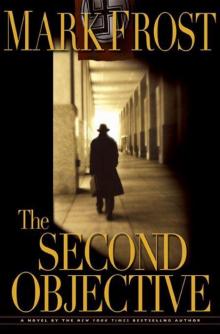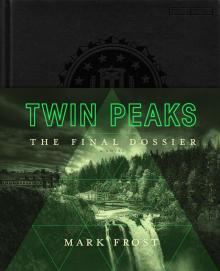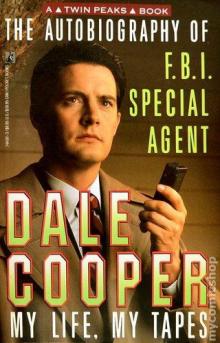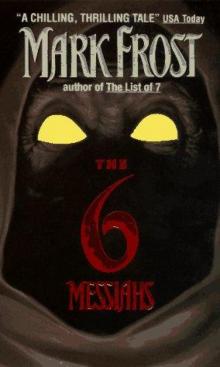- Home
- Mark Frost
The Second Objective Page 6
The Second Objective Read online
Page 6
“We eat now,” he said.
Von Leinsdorf banged on the front door. Bernie peered through the front display window. A massive shape carrying a lantern appeared inside and moved behind the door.
“We close,” said a woman’s voice.
“Das Phoenix steigt. Der Pfeil fliegt,” said Von Leinsdorf.
The Phoenix rises. The Arrow flies.
The woman shuffled to the window and held up the lantern to look at them. She stood over six feet tall, wrapped in a cheap house coat. Bernie shrank back on instinct as she appeared in the light.
Her enormous head looked oblong, misshapen, and her skin was flushed with ragged scarlet patches—a peasant’s face, absent a healthy glow of outdoor labor. Bright, small eyes peered out from beneath a thick ridge of simian bone. A fringe of lank, mousy brown hair hung down in greasy clumps. Her tongue darted out between thick sensual lips as she sized them up. With a sidestep she vanished again, and the door opened.
“Gekommen,” she said.
“Park the jeep around back,” said Von Leinsdorf to Bernie.
Von Leinsdorf and Preuss followed her into the shop. A smell of onions and fried meat wafted off her. With every step waves of cascading fat shimmied down her upper back. She led them through a storeroom behind the sales counter, into a small abattoir with a stained concrete floor. Two bare bulbs provided the only light. A butchered animal carcass hung from a steel hook suspended on a chain connected to a bolt in the ceiling. Judging by the shape, Von Leinsdorf thought it might be a dog. A sharp scent of blood and offal thickened the air. The woman turned sideways to wedge her girth behind the cutting block. She opened a hidden hatch in the wall, then slid out a small shelf revealing a crystal wireless shortwave radio.
“Für zu verwendende Sie,” she said to Leinsdorf.
“Please, fräulein, may we speak English?” asked Von Leinsdorf, indicating Preuss. “My friend needs the practice.”
“The Amis come here, but never find this radio,” she said. “I speak with my contact every day. They tell me you come.”
“Good; that’s what they were supposed to do. The Abwehr was also supposed to leave a package for us here. Do you have it with you?”
“No package. No one comes.”
“Did they contact you about it?”
“No. No Abwehr comes. The Amis take all the food, from all the village. They leave me nothing.” She picked up a large meat cleaver from an array of cutting instruments on the chopping block, which was covered with a mass of some half-minced internal organ. “They don’t tell me you dress like the Amis.”
The cleaver posed both a question and a threat. Von Leinsdorf tried to keep her focused on him, and not Preuss.
“And you mustn’t tell anyone either, fräulein,” said Von Leinsdorf, turning on an authoritative charm. “It is fräulein, isn’t it?”
The big woman blushed, the scarlet patches on her cheeks glowing like embers. “Frau. Frau Escher.”
Bernie entered the house through the back after parking the jeep and came face to face with Frau Escher, clutching the meat cleaver.
“Whoa, what the fuck,” said Bernie.
Von Leinsdorf signaled Bernie to stay calm. “What is your Christian name, my dear?”
“Lisolette,” she said, smiling coquettishly.
“What a pretty name. And might I ask, where is Herr Escher?”
“German Army. Four years. I see him last time two years.”
After a while looking at her, he probably ran all the way to the Russian Front, thought Bernie.
“Four years without your husband is a terrible sacrifice,” said Von Leinsdorf. “We’re proud of you, working for our cause, giving us information with your radio. Risking your life during this American occupation. You’ve done a great service for your country.”
She blushed again. “So kind of you to say.”
Bernie couldn’t tell if she was crazy or just simple. Maybe it was both.
“Another favor, Frau Escher,” said Von Leinsdorf. “We were told you could give us something to eat. And shelter for the night.”
“I would be happy,” she said; then she frowned and re-gripped the cleaver. “But why you dress like the Amis?”
“A top secret assignment,” said Von Leinsdorf. Then whispering: “On orders from the Führer himself.”
“No.”
“I swear to you, it’s true.”
“Mein Gott. I go now. You eat.”
Frau Escher laid down the cleaver, flashed a travesty of a schoolgirl smile at Von Leinsdorf, and waddled into the front room. Von Leinsdorf signaled the others to follow, while he turned to the radio. He fingered the tuning knobs; their slotted grooves were slippery with clotted animal fat.
Disgusted, Von Leinsdorf took out his handkerchief and wiped off the knobs. He dialed in the frequency for their corps command post, twelve miles east of the border. He spoke in prearranged code, broadcasting less than a minute, letting headquarters know they were safely across. He made it clear their other jeep squads should steer clear of the Elsenborn logging road, but made no mention of the shooting at the checkpoint. He also let them know the package they’d expected to find from the Abwehr in Waimes had not arrived. After a pause, the dispatcher told him to return to the butcher shop the next day and try again.
Report of their success encouraged Colonel Skorzeny to step up deployment of their remaining commando squads. Before dawn, nine more advance teams of Operation Greif would infiltrate the American line.
Then there would be only twenty-fours hours until it began.
8
Spa, Belgium
DECEMBER 15, 2:00 A.M.
Shortly after Earl Grannit and Ole Carlson arrested Captain John Stringer and his squadron of thieves near the Clermont station, two platoons of MPs raided the 724th’s barracks at Liège and dropped a net over the rest of C Company. MPs herded the suspects into the ballroom of the Hotel Britannique. Set on top of a ridgeline to the north of the Losheim Gap, this marshy plateau around Spa had been uninhabitable until the Romans discovered natural thermal baths percolating up from under the barren sulfuric soil. Over the centuries, as the city of Spa grew to accommodate the well-heeled travelers who came to bask in those beneficial waters, the name became the generic term for all such pleasure-seeking temples. Since early October, Spa’s ornate nineteenth-century resorts had all been commandeered by First Army.
When he arrived at the hotel, Grannit was pleased to see over ninety anxious GIs cooling their heels in the ballroom. The two officers, and three others who’d been hauled in from the barracks, including the battalion commander, had been confined to private rooms upstairs. Grannit and Carlson filled out their paperwork in the hotel’s ornate lobby, smoked cigarettes, and ordered coffee and sandwiches from the kitchen, while they waited for their superiors and counterparts in Army Intelligence to arrive.
“What the heck is this, Spam?” asked Carlson, scrutinizing the contents of his sandwich.
“Pâté,” said Grannit.
Carlson kept staring at it. “Sure looks like Spam.”
“I’m pretty sure they use some of the same parts.”
“Of what?”
“Of whatever goes into Spam. Pig, cow,” said Grannit, taking another big bite.
Eyeing the meat spread suspiciously, Ole took an exploratory sniff.
“It’s not going to bite back, Ole.”
“Smells iffy,” said Carlson.
“You eat Spam, don’t you?”
“Sure. Spam’s great. Breakfast, lunch, and dinner. Fourteen different ways.”
“Trust me on this,” said Grannit. “Whatever parts of those pigs or cows that’s in Spam? What’s in here is from higher up.”
Ole put the sandwich back together, took a small, cautious bite, and rolled it around in his mouth for a while.
“You’re right, Earl,” said Carlson. “That is a whole lot tastier than Spam.”
They’d only been partnered a few weeks. Carlson had
been an insurance investigator and volunteer fireman back home in Sioux Falls. Grannit liked how that prepared him for both the quick, unpredictable action and the crushingly dull aftermath of police work. Ole had gone through training as an MP before being transferred to CID, where he specialized in forgery and document work, the area of insurance fraud that he’d trained in. Ole was religious, always went to chapel on Sundays, and said his prayers but never threw it at you. He liked Ole for his flat, halting Midwestern voice, too, his blond brush cut on a head like a shot put, and his straight-ahead nature.
“Man, I like this French coffee,” said Carlson. “Got some hair on it. Makes you want to stand up and say hello.”
“That’s Belgian coffee,” said Grannit.
Ole just nodded. He watched two uniformed MPs lead another group of GI suspects through the lobby. “You gonna handle interrogating these boys?”
“Many as they’ll let me,” said Grannit.
“That the kind of thing you do back in New York, Earl?”
“That’s right, Ole.”
“Thieves and murderers and rapists—”
“We didn’t turn anybody away.”
“Man oh man oh man. Life in the big city.” Ole pondered for a moment. “Could I watch you interrogating these fellas?”
“That’s not up to me,” said Grannit.
“I figure I could pick up a lot from that. About detective work and what have you.”
“Nothing personal, okay? This ain’t night school. Just keep your eyes open and don’t pass up an opportunity to shut the hell up. What you do with it after is your business.”
“Sure, okay,” said Carlson. “I can tell you’re mad, though. Makes me mad, too, these railroad bums. Thinking about what they did.”
“Don’t lose any sleep over it.”
Grannit finished his sandwich, stretched out on the sofa, pulled his hat down over his eyes, and folded his arms. Carlson had watched him do this before, grabbing short bursts of shut-eye, and figured it for an old detective’s trick, catnapping when he got the chance. Ole decided to give it a try and squirmed to get comfortable in the big overstuffed chair. Grannit cocked open an eye and watched Ole decide whether or not he should park his muddy boots on a heavy gilded table. Then he got up, spread out an edition of Stars and Stripes on the table, sat back down, and eased one boot down and then the other on the folded page.
Grannit pulled his hat back down. There was the occasional shit about Ole that drove him nuts, too.
A young captain and lieutenant from Army Intelligence showed up at five in the morning, throwing their weight around, while their adjutants ran around for coffee and donuts. When they started bitching about how hard they were going to have to work to keep the whole stinking Railway Battalion story out of the New York Times, Grannit turned over a table in their laps.
“We just broke the biggest criminal case of the war trying to solve a front-line morale problem, so I don’t give a fuck it’s a public relations headache for some rear-echelon horse’s ass. You got that?”
Grannit’s superiors from CID showed up in time to hear that and let it drop that Lieutenant Grannit had fifteen years in NYPD robbery-homicide. The hotshots from Intelligence seemed eager to tidy up their paperwork and hit the road.
At daybreak, over breakfast, the CID prosecutors laid out what they hoped to hear from these suspects before their courts-martial. Grannit liked what he heard about due process in a military tribunal: They required less burden of proof during war time, which meant no lawyering bullshit from defendants’ counsel. But Supreme Command wanted this mess scooped up and thrown out with the trash, and no ink spilled in the press with the war headed into the final innings. Home-front spirits were riding high, and nobody wanted to spoil Mom and Pop’s Sunday dinner dwelling on the sordid details about these greedy, thieving pricks.
“How we going to do that, Earl?” they asked.
“You need confessions,” said Grannit.
“What we’re hearing so far,” said one of the senior MPs, “is that none of ’em wants to cooperate.”
None of them had a solution. Grannit held back, reminding himself that CID was a brand-new unit, less than four months in the field, organized to handle major felony crimes committed by GIs against fellow soldiers or civilians. With such limited time to get on its feet, they’d barely had a chance to print manuals, let alone train their personnel. To keep peace at home when the war broke out, Uncle Sam handed every working American cop a draft exemption. Grannit had tried to enlist during the first weeks of the war, but NYPD brass said he was too valuable to let go. Twenty-seven months and one pricey midtown lawyer later, he had argued his way off the force and into the army without forfeiting his pension. The next day they shipped him to the new Criminal Investigation Division training base in Michigan.
His superiors had never worked a day in civilian law enforcement. They were career soldiers in the Military Police, straight as their standard-issue neckties. You wanted traffic control in a crowded staging area, a fight in a dockside bar suppressed, or chain of custody maintained on prisoners of war? That played to the MPs’ strengths—logistics, discipline, and security; all beat-cop talents—but they were ill equipped for felony detective work. In less than a week the men trying to run CID realized Grannit knew more about organizing a criminal investigation force than they did. The railroad case had taken six weeks to crack, and Grannit had quarterbacked the effort. Now they were waiting for him to send in the next play.
“What you got here is a massive racketeering operation,” said Grannit. “Organized crime, like we had on the Brooklyn docks.”
“You work those cases?”
“A couple.”
“How’d you break ’em?”
“Hook a small fish. Small fish gives up a bigger fish. Roll ’em over like that all the way up the line.”
“HQ needs this to go away today,” said the senior CID man.
“Then for starters,” said Grannit, “let me talk to ’em.”
Grannit strolled through the holding area in the ballroom, studying faces. He picked out six men, including Corporal Eddie Bennings. They were hustled upstairs to the fourth floor and tossed into a room. Grannit had some MPs empty out the furniture, turn off the heat, and open the windows to the balcony. He let the suspects stew for an hour in the freezing cold, with orders to keep silent. The first time the MPs outside heard one of them say a word, they marched in and took away their matches and cigarettes. Whenever one of them dozed off, the MPs kicked him awake.
Two hours later, Grannit walked into the hotel room, followed by the three biggest MPs in the unit, swinging their nightsticks. Grannit wore a brown civilian suit with no badge or insignia. He explained to the prisoners that during the next fifteen minutes they were each going to write and sign a confession detailing their involvement in the battalion’s black-market activities. He set paper and pens down in the middle of the floor and lit a cigarette. The six men looked at him and one another, but no one moved toward the pens.
Grannit finished his cigarette, walked over to the toughest-looking guy in the group, slammed his head into the wall, and went to work on his kidneys. By the time he finished, the man was urinating on himself and four of the other five suspects had pens in their hands. Each was escorted to a separate, heated room down the hall, where they were told a hot meal and a cocktail of their choice would be served as soon as they finished their confessions.
Grannit stayed in the cold room with Eddie Bennings, the one man who hadn’t picked up a pen.
“You’re not going to write a statement?”
“Fuck you,” said Bennings.
Grannit ordered the other MPs out of the room and lit another cigarette.
“I know you from someplace, Eddie?”
“Where the fuck would I know you from?”
“You ever been fingerprinted in a New York police station? Done any time? Eduardo DiBiaso, that’s the name you were born with, isn’t it?”
&n
bsp; “Where’d you get that?”
“Right here on your paperwork, Eduardo. Why is that, you change it for the draft board to get the stink of garlic off you? Or were you dodging a warrant?”
Bennings narrowed his gaze, working hard to show how little he cared. Grannit had known this pissant had a rap sheet the moment he laid eyes on him, strictly small potatoes, a wannabe who’d clocked enough time around the mob to lose his moral compass.
“You got a wife and kids back home, Bennings?”
“I got a wife.”
“That where you’re sending the money? Home to the wife?” No response. “Which makes her an accessory after the fact. We could go after her, too. Send the NYPD to her door. What’s her taste been so far, five thousand? Ten?”
“I got nothing to say till I talk to a lawyer.”
“Lawyer? Where the fuck you think you are, Hoboken? There’s no justice system here. There’s no neighborhood capo back home taking care of the family ’cause you kept your mouth shut. Military courts don’t work that way. This ain’t some penny-ante beef, pinching rum off the back of a Seagram’s truck. These are war crimes, pal. People go to jail for life or face a firing squad. We got you on ice. You don’t play ball, you’re never gonna see your wife again.”
“Bullshit.”
“And once word gets around how you guys ripped off our troops in the field? Life in the brig is gonna be some hard fucking time.”
The first crack showed in Eddie’s practiced tough-guy facade. “What about it?”
“We know you got a relationship with the officers running this show. You brought some experience from home; they trust you ’cause you got things done. You’re a key man for them. You want to tell me anything different?”
Eddie didn’t.
“Help us put those big shots in the pokey and the system’s gonna treat you better. That’s common sense. Your boys are soldiers, not gangsters, so nobody’s coming back at you if you roll over, you might not even stand trial. A slap on the wrist, maybe. They transfer you into another unit with no jail time.”

 Rogue
Rogue The Second Objective
The Second Objective Alliance
Alliance Twin Peaks: The Final Dossier
Twin Peaks: The Final Dossier The Paladin Prophecy
The Paladin Prophecy Game Six: Cincinnati, Boston, and the 1975 World Series: The Triumph of America's Pastime
Game Six: Cincinnati, Boston, and the 1975 World Series: The Triumph of America's Pastime The List of Seven
The List of Seven The Autobiography of FBI Special Agent Dale Cooper
The Autobiography of FBI Special Agent Dale Cooper The Six Messiahs
The Six Messiahs The Secret History of Twin Peaks
The Secret History of Twin Peaks Paladin Prophecy 2: Alliance
Paladin Prophecy 2: Alliance Game Six
Game Six